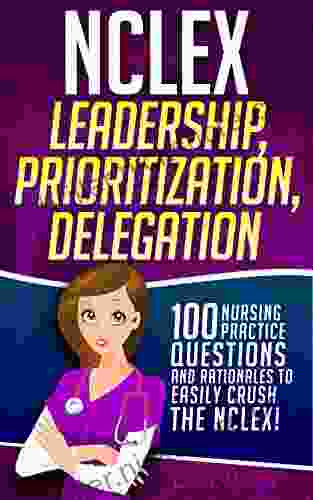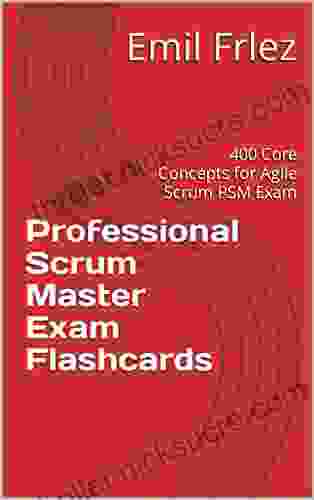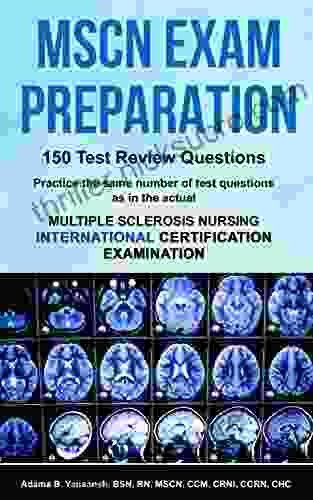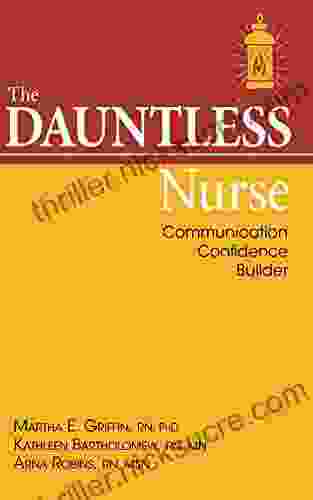400 Core Concepts for Agile Scrum PSM Exam: A Comprehensive Guide to Scrum Certification

To prepare for the PSM exam, it is essential to have a solid foundation in the core concepts of Scrum. This article provides a comprehensive guide to the 400 most important Scrum concepts, covering the Scrum Guide, Scrum roles, Scrum events, Scrum artifacts, and more.
The Scrum Guide is the primary source of information about Scrum. It provides a concise and comprehensive overview of the framework, including its principles, values, and practices.
The Scrum Guide is organized into three sections:
4 out of 5
| Language | : | English |
| File size | : | 838 KB |
| Text-to-Speech | : | Enabled |
| Screen Reader | : | Supported |
| Enhanced typesetting | : | Enabled |
| Print length | : | 168 pages |
| Lending | : | Enabled |
- : This section provides an overview of Scrum, its origins, and its benefits.
- Theory and Structure: This section describes the principles and values of Scrum, as well as the framework's structure, roles, events, and artifacts.
- Applying Scrum: This section provides guidance on how to apply Scrum in practice, including how to start a Scrum project, how to run a Sprint, and how to measure progress.
There are three primary roles in Scrum:
- Product Owner: The Product Owner is responsible for defining the product vision, prioritizing the product backlog, and ensuring that the team is building the right product.
- Scrum Master: The Scrum Master is responsible for facilitating the Scrum process, removing impediments to progress, and coaching the team.
- Development Team: The Development Team is responsible for developing the product.
Each Scrum role has its own unique responsibilities and accountabilities. It is important for all members of the Scrum team to understand their roles and how they contribute to the success of the project.
There are four Scrum events:
- Sprint Planning: The Sprint Planning event is held at the beginning of each Sprint. The purpose of this event is to plan the work that will be completed during the Sprint.
- Sprint Review: The Sprint Review event is held at the end of each Sprint. The purpose of this event is to review the work that was completed during the Sprint and to get feedback from stakeholders.
- Sprint Retrospective: The Sprint Retrospective event is held at the end of each Sprint. The purpose of this event is to reflect on the Sprint and to identify ways to improve the team's performance.
- Daily Scrum: The Daily Scrum is a daily stand-up meeting where the team discusses progress, identifies impediments, and plans for the day.
These four Scrum events are essential for the success of the Scrum process. They provide opportunities for the team to plan, review, and improve their work.
There are three Scrum artifacts:
- Product Backlog: The Product Backlog is a prioritized list of all the features and functionality that the product team wants to build.
- Sprint Backlog: The Sprint Backlog is a list of the work that the team has committed to completing during the Sprint.
- Increment: The Increment is the completed work that is produced at the end of each Sprint.
These three Scrum artifacts are used to track progress and to ensure that the team is building the right product.
Scrum is based on five core values:
- Commitment: Scrum teams are committed to completing the work that they have committed to do.
- Courage: Scrum teams have the courage to make difficult decisions and to face challenges head-on.
- Focus: Scrum teams stay focused on the most important work and avoid distractions.
- Openness: Scrum teams are open to feedback and to changing their plans as necessary.
- Respect: Scrum teams respect each other and value each other's contributions.
These five Scrum values are essential for creating a high-performing Scrum team.
Scrum is based on twelve core principles:
- Empirical Process Control: Scrum is an empirical process control framework that uses feedback to guide decision-making.
- Self-Organization: Scrum teams are self-organizing and make their own decisions about how to get their work done.
- Transparency: Scrum is a transparent framework where everyone can see the work that is being done and the progress that is being made.
- Time-Boxed Events: Scrum events are time-boxed, which means they have a fixed duration.
- Iterative and Incremental Development: Scrum is an iterative and incremental development framework that produces working increments of the product with each Sprint.
- Value-Based Prioritization: Scrum teams prioritize their work based on value, which means they focus on the work that will deliver the most value to the customer.
- Sustainable Pace: Scrum teams work at a sustainable pace that they can maintain over time.
- Respect for People: Scrum teams respect each other and value each other's contributions.
- Simplicity: Scrum is a simple framework that is easy to understand and use.
- Customer Collaboration: Scrum teams collaborate closely with customers to ensure that they are building the right product.
- Continuous Improvement: Scrum teams are constantly improving their processes and practices.
These twelve Scrum principles provide the foundation for the Scrum framework.
The 400 core concepts covered in this article are essential for passing the PSM exam and for successfully applying Scrum in practice. By understanding these concepts, you can gain a deep understanding of Scrum and how it can help you deliver complex products and services quickly and efficiently.
In addition to studying the core concepts, it is also important to practice using Scrum in real-world projects. This will help you to develop the skills and experience necessary to be successful as a Scrum Master or other Scrum team member.
With hard work and dedication, you can achieve your goal of becoming a certified Scrum Master and a valuable asset to your organization.
4 out of 5
| Language | : | English |
| File size | : | 838 KB |
| Text-to-Speech | : | Enabled |
| Screen Reader | : | Supported |
| Enhanced typesetting | : | Enabled |
| Print length | : | 168 pages |
| Lending | : | Enabled |
Do you want to contribute by writing guest posts on this blog?
Please contact us and send us a resume of previous articles that you have written.
 Fiction
Fiction Non Fiction
Non Fiction Romance
Romance Mystery
Mystery Thriller
Thriller SciFi
SciFi Fantasy
Fantasy Horror
Horror Biography
Biography Selfhelp
Selfhelp Business
Business History
History Classics
Classics Poetry
Poetry Childrens
Childrens Young Adult
Young Adult Educational
Educational Cooking
Cooking Travel
Travel Lifestyle
Lifestyle Spirituality
Spirituality Health
Health Fitness
Fitness Technology
Technology Science
Science Arts
Arts Crafts
Crafts DIY
DIY Gardening
Gardening Petcare
Petcare Douglas Wood
Douglas Wood Timothy A Sisemore
Timothy A Sisemore Jhenah Telyndru
Jhenah Telyndru Scott Zimmerman
Scott Zimmerman Jeremy Bradstreet
Jeremy Bradstreet Michael Masters
Michael Masters Kusha Karvandi
Kusha Karvandi Nicholas Gallo
Nicholas Gallo Tim Falconer
Tim Falconer Grete Waitz
Grete Waitz Michael Barkun
Michael Barkun Richard Bass
Richard Bass Nicholas Bjorn
Nicholas Bjorn Maria Sharapova
Maria Sharapova Oded Galor
Oded Galor 1st Ed 2018 Edition Kindle Edition
1st Ed 2018 Edition Kindle Edition Emily Lauren Dick
Emily Lauren Dick Emilee Day
Emilee Day Celina Grace
Celina Grace Toni Weschler
Toni Weschler Adam Night
Adam Night Mick Conefrey
Mick Conefrey Janice L Raymond
Janice L Raymond Frederick Grinnell
Frederick Grinnell Lisa Leake
Lisa Leake Patty Wipfler
Patty Wipfler Keith Ryan Cartwright
Keith Ryan Cartwright Jules Wake
Jules Wake Mark J Ferrari
Mark J Ferrari Natalia Ilyin
Natalia Ilyin Lindsey Schlessinger
Lindsey Schlessinger Genie Reads
Genie Reads Brett Cohen
Brett Cohen Samuel Greenberg
Samuel Greenberg Steve Williams
Steve Williams Kara Forney
Kara Forney Joseph Ewing
Joseph Ewing Jemar Tisby
Jemar Tisby Maurice Herzog
Maurice Herzog Ann Imig
Ann Imig Jennifer Block
Jennifer Block Samuel Arbesman
Samuel Arbesman Murray Shukyn
Murray Shukyn F Brent Neal
F Brent Neal Joyce Harper
Joyce Harper David M Ewalt
David M Ewalt Neil S Jacobson
Neil S Jacobson John Cooper
John Cooper Sandy Jones
Sandy Jones Kerry Mcdonald
Kerry Mcdonald Cindy Margolis
Cindy Margolis Michael Mason
Michael Mason D Enette Larson Meyer
D Enette Larson Meyer Pastor Ahyh
Pastor Ahyh Alex Horne
Alex Horne Claudia M Gold
Claudia M Gold Catherine Shainberg
Catherine Shainberg Lee Alan Dugatkin
Lee Alan Dugatkin Bonnie Henderson
Bonnie Henderson Robin Dunbar
Robin Dunbar Damien Cox
Damien Cox Esther Hicks
Esther Hicks Steven W Vannoy
Steven W Vannoy Paula Brackston
Paula Brackston Megan Whalen Turner
Megan Whalen Turner D Levesque
D Levesque Courtney Macavinta
Courtney Macavinta Mary Heffernan
Mary Heffernan Thomas A Jacobs
Thomas A Jacobs Linda Carter
Linda Carter Penny Alexander
Penny Alexander Deepak Chopra
Deepak Chopra Colleen Craig
Colleen Craig Steven Emanuel
Steven Emanuel Christy Teglo
Christy Teglo Nate Allen
Nate Allen Nicole Morales Lm Cpm
Nicole Morales Lm Cpm Bret Stetka
Bret Stetka Fritjof Capra
Fritjof Capra Ned Mcintosh
Ned Mcintosh Mariana Monteiro
Mariana Monteiro Danny Staple
Danny Staple Einat L K
Einat L K Marco Polo
Marco Polo Lucas Chancel
Lucas Chancel David Hoffman
David Hoffman Matt Morton
Matt Morton Jackson T Markbrown
Jackson T Markbrown Doug Peacock
Doug Peacock William Trubridge
William Trubridge Steve Bromley
Steve Bromley Jaime Flowers
Jaime Flowers Meg Cabot
Meg Cabot Frederick L Coolidge
Frederick L Coolidge Ronald M Rapee
Ronald M Rapee Heather Rose
Heather Rose James Dean
James Dean Jp Lepeley
Jp Lepeley David Hatcher Childress
David Hatcher Childress Nehemia Gordon
Nehemia Gordon Mary Morrison
Mary Morrison Sam Sorbo
Sam Sorbo Smart Edition
Smart Edition Deborah Shouse
Deborah Shouse Loan Le
Loan Le Trish Kuffner
Trish Kuffner Denise Long
Denise Long Kira Breed Wrisley
Kira Breed Wrisley Breanna Hayse
Breanna Hayse Ron Lieber
Ron Lieber Elizabeth Davis
Elizabeth Davis Lucia Guglielminetti
Lucia Guglielminetti Dr Lena Edwards
Dr Lena Edwards George Case
George Case Steven Hugg
Steven Hugg Dr Monique Thompson Dha Lpc
Dr Monique Thompson Dha Lpc Patti Henry
Patti Henry Kathleen Cushman
Kathleen Cushman John Wesson
John Wesson Nick Heil
Nick Heil Marguerite Henry
Marguerite Henry John Jeffries Martin
John Jeffries Martin Mike Weatherstone
Mike Weatherstone Diane Ravitch
Diane Ravitch Tim Dunn
Tim Dunn Steve Guest
Steve Guest Harry Vardon
Harry Vardon Juliet Miller
Juliet Miller Jonti Marks
Jonti Marks Miguel Crespo
Miguel Crespo Nancy Boyd Franklin
Nancy Boyd Franklin Renee Jain
Renee Jain Kindle Edition
Kindle Edition Tobe Melora Correal
Tobe Melora Correal Gustav Meyrink
Gustav Meyrink Sonja Schwartzbach
Sonja Schwartzbach Dava Sobel
Dava Sobel Steve Oakes
Steve Oakes Carol Kaesuk Yoon
Carol Kaesuk Yoon Joel Ingersoll
Joel Ingersoll Robert Wright
Robert Wright Stephanie Perkins
Stephanie Perkins Htebooks
Htebooks Daniel Bagur
Daniel Bagur Kelle James
Kelle James Michael Omi
Michael Omi Cecilia Twinch
Cecilia Twinch Tyler Hamilton
Tyler Hamilton William Souder
William Souder Inge Bell
Inge Bell John Mcenroe
John Mcenroe Kate S Martin
Kate S Martin William Shakespeare
William Shakespeare Dinesh Kumar Goyal
Dinesh Kumar Goyal Ilchi Lee
Ilchi Lee Chase Hassen
Chase Hassen Wilborn Hampton
Wilborn Hampton Debra Fine
Debra Fine Ted Franklin Belue
Ted Franklin Belue Joanna Sayago Golub
Joanna Sayago Golub Luis Angel Echeverria
Luis Angel Echeverria Douglas R Hofstadter
Douglas R Hofstadter Vincent W Davis
Vincent W Davis Paul Carus
Paul Carus Henry Worsley
Henry Worsley Brian Everitt
Brian Everitt Nora Roberts
Nora Roberts Matthew Desmond
Matthew Desmond Lily Raff Mccaulou
Lily Raff Mccaulou Ryan M Cleckner
Ryan M Cleckner Rahul Jandial
Rahul Jandial Karen Wilkinson
Karen Wilkinson Guy P Harrison
Guy P Harrison Terence Tao
Terence Tao Gjoko Muratovski
Gjoko Muratovski Don Brown
Don Brown Brian R King
Brian R King Carlo Zen
Carlo Zen Jim White
Jim White Jeannette De Wyze
Jeannette De Wyze Piero Ferrucci
Piero Ferrucci Jeanne Ellis Ormrod
Jeanne Ellis Ormrod Stephen Wood
Stephen Wood Michael Sullivan Iii
Michael Sullivan Iii Caitlyn Dare
Caitlyn Dare Laurie A Watkins
Laurie A Watkins M A Hayat
M A Hayat Ji Kim
Ji Kim Steven Cross
Steven Cross Roman Gurbanov
Roman Gurbanov Phillip Stephen Schulz
Phillip Stephen Schulz Masaaki Kijima
Masaaki Kijima Jackie Freeman
Jackie Freeman Pedro Sarmiento De Gamboa
Pedro Sarmiento De Gamboa Claudia Gray
Claudia Gray Soong Chan Rah
Soong Chan Rah Luis Preto
Luis Preto Eric Michael
Eric Michael J R Mathews
J R Mathews Michael Sean Comerford
Michael Sean Comerford Brian Herne
Brian Herne Eduardo Montano
Eduardo Montano D S Malik
D S Malik F R Lifestyle
F R Lifestyle Steve Schwartz
Steve Schwartz Ivan Savov
Ivan Savov Patricia Wooster
Patricia Wooster Tom M Apostol
Tom M Apostol Rick Steves
Rick Steves Matt Schifferle
Matt Schifferle Jean Nayar
Jean Nayar Karen Ward Mahar
Karen Ward Mahar Mike Eastman
Mike Eastman Cecelia Ahern
Cecelia Ahern Jeremy J Baumberg
Jeremy J Baumberg Lori Lyons
Lori Lyons Heyward Coleman
Heyward Coleman Mark Howard
Mark Howard P A Johnson
P A Johnson Molly Caldwell Crosby
Molly Caldwell Crosby Milne Cc Pocock
Milne Cc Pocock Eric R Dodge
Eric R Dodge James Zug
James Zug Martin A Lee
Martin A Lee Ethan Bezos
Ethan Bezos St Teresa Of Avila
St Teresa Of Avila Sean Michael Wilson
Sean Michael Wilson Gerald R Allen
Gerald R Allen Steven Trustrum
Steven Trustrum Peggy Kaye
Peggy Kaye Richard A Jaffe
Richard A Jaffe William Albert Robinson
William Albert Robinson Mitchel P Roth
Mitchel P Roth Christopher Clarey
Christopher Clarey David Mcclung
David Mcclung Dave Cutcher
Dave Cutcher John D Couch
John D Couch Lana Peek
Lana Peek Cheryl Diamond
Cheryl Diamond Laura A Jana
Laura A Jana George Olsen
George Olsen Marc Bona
Marc Bona Rosalyn Sheehy
Rosalyn Sheehy Karl F Kuhn
Karl F Kuhn Colleen Doyle Bryant
Colleen Doyle Bryant Jodi Aman
Jodi Aman Matt Parker
Matt Parker Edith Hall
Edith Hall Martin Wells
Martin Wells Lucy Hopping
Lucy Hopping Mitt Romney
Mitt Romney Scott Haines
Scott Haines Clyde Soles
Clyde Soles Jacqueline Houtman
Jacqueline Houtman Rachel Mcgrath
Rachel Mcgrath James M Jones
James M Jones Jd Tanner
Jd Tanner Rob Collins
Rob Collins Calvin Trillin
Calvin Trillin Iwan Rhys Morus
Iwan Rhys Morus Joanne M Flood
Joanne M Flood Elwyn Hartley Edwards
Elwyn Hartley Edwards Shayla Black
Shayla Black Krishna Godhania
Krishna Godhania Jane Albert
Jane Albert Keith Ammann
Keith Ammann S Connolly
S Connolly Nibedit Dey
Nibedit Dey Paul Farmer
Paul Farmer Jameswesley Rawles
Jameswesley Rawles Jimmie Holland
Jimmie Holland Elsevier
Elsevier Scott Hawthorn
Scott Hawthorn Emil Frlez
Emil Frlez Kaylene Yoder
Kaylene Yoder Caitlin Flanagan
Caitlin Flanagan Kate Mcmillan
Kate Mcmillan Jay Asher
Jay Asher John M Taylor
John M Taylor Joyce Bas
Joyce Bas Scott Reed
Scott Reed James A Whittaker
James A Whittaker Curtis Wilkie
Curtis Wilkie Xavier Wells
Xavier Wells Bruce Lee
Bruce Lee Neil Postman
Neil Postman Estelle Dautry
Estelle Dautry Warren Hansen
Warren Hansen Hal R Varian
Hal R Varian John Connelly
John Connelly Cal Ripken
Cal Ripken Jeannie Burlowski
Jeannie Burlowski Wil Fleming
Wil Fleming Shannon Warden
Shannon Warden Kalynn Bayron
Kalynn Bayron Michael O Emerson
Michael O Emerson Dawna Markova
Dawna Markova Dan Washburn
Dan Washburn Lewis Black
Lewis Black Judith A Owens
Judith A Owens Pittacus Lore
Pittacus Lore Eric C Lindstrom
Eric C Lindstrom Genevieve Bardwell
Genevieve Bardwell Nadim Saad
Nadim Saad David Levithan
David Levithan Steven Shapin
Steven Shapin Jason Brick
Jason Brick Malcolm Hebron
Malcolm Hebron Daniel Vaughan
Daniel Vaughan Joan Nathan
Joan Nathan Bobbi Conner
Bobbi Conner Tadashi Yoshimura
Tadashi Yoshimura Don L Gates
Don L Gates Mahmood Mamdani
Mahmood Mamdani Rob Vollman
Rob Vollman Arthur Scott Bailey
Arthur Scott Bailey Derick Lugo
Derick Lugo Dave Ramsey
Dave Ramsey Karen E Mcconnell
Karen E Mcconnell E G Richards
E G Richards Derek Blasberg
Derek Blasberg Cassandra Overby
Cassandra Overby Marc J Reilly
Marc J Reilly Thao Te
Thao Te Santari Green
Santari Green Lukas M Verburgt
Lukas M Verburgt Chukwuma Eleodimuo
Chukwuma Eleodimuo T D Wilson
T D Wilson Brett Stewart
Brett Stewart Peter Wacht
Peter Wacht Steven Verrier
Steven Verrier Ksenia K
Ksenia K Adrienne Onofri
Adrienne Onofri Vicki Franz
Vicki Franz Carol Dawson
Carol Dawson Salima Ikram
Salima Ikram Stuart Woods
Stuart Woods Roach Mary
Roach Mary Roshani Chokshi
Roshani Chokshi Carol Walters
Carol Walters Robert Ullman
Robert Ullman Steve Wiegand
Steve Wiegand J R Harris
J R Harris David Flanagan
David Flanagan Colleen Houck
Colleen Houck Harry Bauld
Harry Bauld Melinda Tankard Reist
Melinda Tankard Reist Daniel Bergner
Daniel Bergner T J Tomasi
T J Tomasi Brooks Blevins
Brooks Blevins J F James
J F James Matt Doeden
Matt Doeden Jay H Lefkowitch
Jay H Lefkowitch David Murray
David Murray Sue Wieger
Sue Wieger Melanie Challenger
Melanie Challenger Melissa Trevathan
Melissa Trevathan Garrett Redfield
Garrett Redfield Patrick Carnes
Patrick Carnes Kathleen Taylor
Kathleen Taylor Brian Kilmeade
Brian Kilmeade Nathan Halberstadt
Nathan Halberstadt James Floyd Kelly
James Floyd Kelly Michel Odent
Michel Odent Kyle Rohrig
Kyle Rohrig Phyllis Books
Phyllis Books Brian W Kernighan
Brian W Kernighan Rick J Scavetta
Rick J Scavetta Howtodressage
Howtodressage Phil Williams
Phil Williams Bryan Berard
Bryan Berard Maggie Dallen
Maggie Dallen John Monaghan
John Monaghan Sriman Sharma
Sriman Sharma Brogan Steele
Brogan Steele Sandra M Nettina
Sandra M Nettina David Barrett
David Barrett Charles Wilson
Charles Wilson Kevin Marx
Kevin Marx Brett Hull
Brett Hull Grace Mccready
Grace Mccready Kicki Hansard
Kicki Hansard Megan Kelley Hall
Megan Kelley Hall Lenore Skenazy
Lenore Skenazy James O Prochaska
James O Prochaska Natalia Rojas
Natalia Rojas Jason Sandy
Jason Sandy Larry A Yff
Larry A Yff Peggy Tharpe
Peggy Tharpe Jonathan Grix
Jonathan Grix Colette Harris
Colette Harris Megan Smolenyak
Megan Smolenyak Stephanie Sarkis
Stephanie Sarkis Martin Odersky
Martin Odersky John Mclachlan
John Mclachlan Susan F Paterno
Susan F Paterno Rachel Love Nuwer
Rachel Love Nuwer Kent Hoffman
Kent Hoffman Jacques Vallee
Jacques Vallee Brian Noyes
Brian Noyes Rich Cohen
Rich Cohen Jez Cajiao
Jez Cajiao Erin Mckittrick
Erin Mckittrick Dan Fullerton
Dan Fullerton Stephen Hawking
Stephen Hawking Avery Faigenbaum
Avery Faigenbaum Peter Zuckerman
Peter Zuckerman Mark Seemann
Mark Seemann Cal Pater
Cal Pater Brion Toss
Brion Toss E L Konigsburg
E L Konigsburg David Barrie
David Barrie James Kaiser
James Kaiser Joseph Burbridge
Joseph Burbridge John A Fortunato
John A Fortunato Richard Hingley
Richard Hingley Samantha Michaels
Samantha Michaels Seb Falk
Seb Falk Lucinda Scala Quinn
Lucinda Scala Quinn Pat Manocchia
Pat Manocchia Kevin Alexander
Kevin Alexander Florence Weiser
Florence Weiser Clayton King
Clayton King Keith Foskett
Keith Foskett Bruce A Fenderson
Bruce A Fenderson Manfred Theisen
Manfred Theisen Grace Friedman
Grace Friedman Brian Reddington
Brian Reddington Mike Adams
Mike Adams Mark Lazerus
Mark Lazerus Sarah Kleck
Sarah Kleck Bruce Macdonald
Bruce Macdonald Harold Gatty
Harold Gatty Rich Osthoff
Rich Osthoff Helen Zee
Helen Zee Christopher Ketcham
Christopher Ketcham Julie Cangialosi
Julie Cangialosi J Wayne Fears
J Wayne Fears Victor A Bloomfield
Victor A Bloomfield James D Tabor
James D Tabor Richard Kasper
Richard Kasper Lee Mcintyre
Lee Mcintyre Gabriel F Federico
Gabriel F Federico Chuck Callaway
Chuck Callaway Eze Ugbor
Eze Ugbor Brittany Cavallaro
Brittany Cavallaro Collins O Onwe
Collins O Onwe David Sinclair
David Sinclair Jp Kriya
Jp Kriya Kenneth Paul Rosenberg
Kenneth Paul Rosenberg Daniel Dell Uomo
Daniel Dell Uomo Richard Blais
Richard Blais Nicholas S Howe
Nicholas S Howe Elliot Davis
Elliot Davis David Schoem
David Schoem Dr Nanhee Byrnes
Dr Nanhee Byrnes John Moren
John Moren Sarah Lamb
Sarah Lamb Paul Simpson
Paul Simpson Dr Faith G Harper
Dr Faith G Harper John Bradshaw
John Bradshaw Patrick Garbin
Patrick Garbin Sunil Tanna
Sunil Tanna John Major Jenkins
John Major Jenkins Janae M Robinson
Janae M Robinson John Fraser Hart
John Fraser Hart Joanna Faber
Joanna Faber Dusan Petkovic
Dusan Petkovic Jeanne Flavin
Jeanne Flavin Mark Johnston
Mark Johnston Gene Kritsky
Gene Kritsky Charlie Francis
Charlie Francis Michael Shaw
Michael Shaw G E R Lloyd
G E R Lloyd Dr Alison Dibarto Goggin
Dr Alison Dibarto Goggin Chuanwei Li
Chuanwei Li Paul Weamer
Paul Weamer Elizabeth Dupart
Elizabeth Dupart Cpt Exam Prep Team
Cpt Exam Prep Team Rob Coppolillo
Rob Coppolillo Matt Davids
Matt Davids J C Cervantes
J C Cervantes David Hackett Fischer
David Hackett Fischer Joanna Philbin
Joanna Philbin Khalid Khashoggi
Khalid Khashoggi Mary Strand
Mary Strand Charles Todd
Charles Todd Richard Post
Richard Post Leslie Valiant
Leslie Valiant Thomas Malory
Thomas Malory Della Ata Khoury
Della Ata Khoury Mohammad F Anwar
Mohammad F Anwar Matt Wastradowski
Matt Wastradowski Zigzag English
Zigzag English Gerald L Schroeder
Gerald L Schroeder Sara Gaviria
Sara Gaviria Gerson S Sher
Gerson S Sher Martin Sternstein
Martin Sternstein Ernle Bradford
Ernle Bradford Rory D Nelson
Rory D Nelson Judy H Wright
Judy H Wright Guido W Imbens
Guido W Imbens Kathleen Bartholomew
Kathleen Bartholomew Megan Davidson
Megan Davidson Jonathan H Turner
Jonathan H Turner David Jason
David Jason Brian Gewirtz
Brian Gewirtz Jacob Boehme
Jacob Boehme Lisa Druxman
Lisa Druxman O S Hawkins
O S Hawkins Diana J Mason
Diana J Mason Tom Cunliffe
Tom Cunliffe Brienne Murk
Brienne Murk Loyd Ellis
Loyd Ellis Varg Freeborn
Varg Freeborn Dan Jones
Dan Jones David Wootton
David Wootton Lisa Scottoline
Lisa Scottoline Jennifer Comeaux
Jennifer Comeaux Worth Books
Worth Books Jessica Minahan
Jessica Minahan Sujit Sivasundaram
Sujit Sivasundaram Joe Grant
Joe Grant Christine Brennan
Christine Brennan Scott Jurek
Scott Jurek David Cannon
David Cannon James Miller
James Miller Grace Mariana Rector
Grace Mariana Rector Geoffrey Simpson
Geoffrey Simpson Mark Powell
Mark Powell Nachole Johnson
Nachole Johnson Hiram Bingham
Hiram Bingham Inger Mewburn
Inger Mewburn Mark William
Mark William Bernard Darwin
Bernard Darwin Michael A Tompkins
Michael A Tompkins Michael Ruhlman
Michael Ruhlman Ian Tuhovsky
Ian Tuhovsky Alan D Moore
Alan D Moore Ursula Hackett
Ursula Hackett Kazumi Tabata
Kazumi Tabata Porter Shimer
Porter Shimer Paula Span
Paula Span Leigh Pearson
Leigh Pearson Peter Allison
Peter Allison Sara Elliott Price
Sara Elliott Price Carol Newell
Carol Newell
Light bulbAdvertise smarter! Our strategic ad space ensures maximum exposure. Reserve your spot today!
 Peter CarterFollow ·5.9k
Peter CarterFollow ·5.9k Ted SimmonsFollow ·14.3k
Ted SimmonsFollow ·14.3k Neil GaimanFollow ·10.8k
Neil GaimanFollow ·10.8k Tyler NelsonFollow ·7.4k
Tyler NelsonFollow ·7.4k Andrew BellFollow ·16.2k
Andrew BellFollow ·16.2k Brayden ReedFollow ·14.1k
Brayden ReedFollow ·14.1k Levi PowellFollow ·9.1k
Levi PowellFollow ·9.1k Norman ButlerFollow ·14.8k
Norman ButlerFollow ·14.8k

 Guillermo Blair
Guillermo Blair2nd Edition Revised And Expanded 2024: A Comprehensive...
The 2nd Edition Revised...

 Ronald Simmons
Ronald SimmonsDreaming of Ocean Cruising: A Voyage into Tranquility and...
For those seeking a respite from the mundane...

 Darren Nelson
Darren Nelson100 Nursing Practice Questions with Rationales to...
The NCLEX exam is a challenging but...

 Rex Hayes
Rex HayesMastering Bodyweight Training for Martial Arts: A...
For martial...

 Dillon Hayes
Dillon HayesIn The Land Of The Blue Poppies: A Literary Journey to...
Prologue: A Tapestry of...

 Eliot Foster
Eliot FosterCollege University Writing Super Review Flash Card Books:...
College University...
4 out of 5
| Language | : | English |
| File size | : | 838 KB |
| Text-to-Speech | : | Enabled |
| Screen Reader | : | Supported |
| Enhanced typesetting | : | Enabled |
| Print length | : | 168 pages |
| Lending | : | Enabled |












